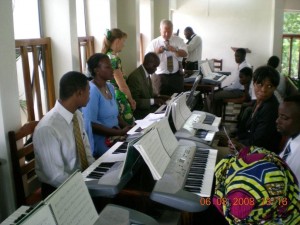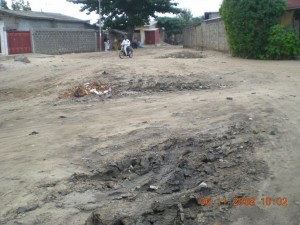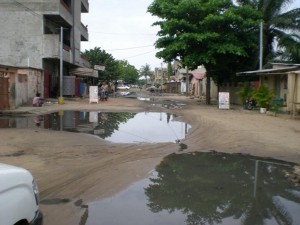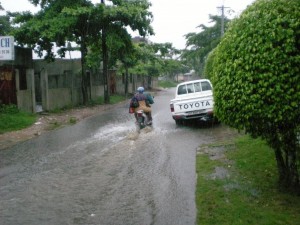On Saturday night when we got home, our guard Seraphin announced that he was going to attend Mass with us on Sunday. We had invited him to go and even driven by the chapel on one of our visits to the hospital but had not pressed it at all. We were glad he wanted to, and he seemed to really enjoy the meetings. It will be interesting to see if he wants to go again.
President Ayekoue, our new mission president, was here on Sunday so we got to meet him very briefly and also hear him speak. He is presently serving as the director of Institute and Seminary for West Africa so he and his replacement were here for seminary and institute graduation that took place in sacrament meeting. After the certificates were given, he spoke for a few minutes. He told the story of a woman who saved up enough money for a train trip and took bread and water to eat as she watched the others eat scrumptiously in the dining car because she didn’t have enough money for additional food. At the end of the trip she leaned that the food was included in the price of the ticket. President Ayekoue pointed out that some members are like that because we have seminary and institute, which are free to all members but some choose not to partake of the feast. We also learned a couple of interesting things. Elder Adou, one of our new elders here, is from Ivory Coast and President Auekoue has been both his bishop and his stake president. Also, one of our branch members is Frere Landou. Frere Landou is Mr. music man in the Branch. He plays the piano fairly well and can lead music and sing so he is pretty valuable in the Branch. Frere Landou served a mission in Ivory Coast (Cote d’Ivoire) about 14 years ago and is the missionary that taught President Ayekoue. We are really looking forward to getting to know him better and working with him. President Ayekoue seems to be a really capable individual. He is a young man, I would guess perhaps 40 years old, although guessing ages is risky in Africa, and speaks really good French but no English. The seminary and institute graduation was a little confusing to Seraphin being at church for the first time. He wondered if they could go and be missionaries now or start their own church. It was a new concept for him that it is just for their own learning and not for professional training as there is no paid ministry in the church.
Speaking of music in the branch, we sure do wish we had the services of Steve or Brielle or Marlene or Amber or anyone else who can play even a little bit. Sister Southam can play just a little so has helped out in the Primary and also spearheaded the music program with the help of Landou. A while back, the church received a large donation from someone to provide for music training in areas where there is very little such as Benin. The result here has been that we have about 25 really nice electronic keyboards on which to give piano lessons. Also there is some very simplified hymn music for beginning piano students. If a student is diligent he or she can actually earn one of the keyboards which is a considerable prize here. So far, only 3 students have earned them but there are several others working toward getting their own.  On Sunday after church, since Sister Southam was leaving, they had planned a recital and had a nice program with about a dozen or so of the student playing hymns they had learned. Sometimes it is only the top hand with a note or two on bottom but it is a major step forward for those who have never seen a piano or a piece of music in their lives before joining the Church. With every investigator, you have to explain the process of singing a hymn – that you don’t start at the top and go straight down but sing the first verse all the way through and then come back to the top to start the second verse. As before stated, there is no problem with enthusiasm, just basic knowledge, but that is why we are here. Almost the whole branch stayed for the recital, and it was really good. Afterwards, Soeur Black and Soeur Southam had prepared a large tray full of rice crispy treats as refreshments. Soeur Black began passing them out. It would have been fine if she could have passed them out fast enough but before she could get through the crowd, all the kids started to recycle and before long she looked like the Pied Piper going up and down rows trying to serve the adults a treat. She finally put the tray up on her head out of reach which was a very African thing to do. Unfortunately, I didn’t get a picture. Maybe these Africans discovered that a long time ago, and that is why they carry everything on their heads. We need to talk some more about carrying things on heads sometime when we have a slow week it that ever happens.
On Sunday after church, since Sister Southam was leaving, they had planned a recital and had a nice program with about a dozen or so of the student playing hymns they had learned. Sometimes it is only the top hand with a note or two on bottom but it is a major step forward for those who have never seen a piano or a piece of music in their lives before joining the Church. With every investigator, you have to explain the process of singing a hymn – that you don’t start at the top and go straight down but sing the first verse all the way through and then come back to the top to start the second verse. As before stated, there is no problem with enthusiasm, just basic knowledge, but that is why we are here. Almost the whole branch stayed for the recital, and it was really good. Afterwards, Soeur Black and Soeur Southam had prepared a large tray full of rice crispy treats as refreshments. Soeur Black began passing them out. It would have been fine if she could have passed them out fast enough but before she could get through the crowd, all the kids started to recycle and before long she looked like the Pied Piper going up and down rows trying to serve the adults a treat. She finally put the tray up on her head out of reach which was a very African thing to do. Unfortunately, I didn’t get a picture. Maybe these Africans discovered that a long time ago, and that is why they carry everything on their heads. We need to talk some more about carrying things on heads sometime when we have a slow week it that ever happens.
After the meeting we were told to go into the Relief Society room along with the Branch Presidency, the Southams, and a few other members. There the Relief Society served us a really nice meal in honor of Elder and Soeur Southam. Church is at 9:00 so they must have gotten up very early to make all of the preparations.
 We spend a great deal of time every day on the busy streets of Cotonou. We need to make a specific explanation of the road conditions here. One may assume that in a city this big there would be nice neighborhoods with paved streets and maybe even some curb and gutter. Wrong! The major roads going out from the etoiles are paved with either concrete or concrete cobble stones. After that it is like driving on the back roads of San Juan County. We are close to the ocean, so all of the ground here is simply sand, sand, sand and more sand. There are no road crews to blade the streets, so big dips and holes are everywhere. When it rains, the big dips fill with lots of water so we just forge ahead and hope the dip is not a too deep for the pickup. The motos go around to the side of the water hole but vehicles have no choice
We spend a great deal of time every day on the busy streets of Cotonou. We need to make a specific explanation of the road conditions here. One may assume that in a city this big there would be nice neighborhoods with paved streets and maybe even some curb and gutter. Wrong! The major roads going out from the etoiles are paved with either concrete or concrete cobble stones. After that it is like driving on the back roads of San Juan County. We are close to the ocean, so all of the ground here is simply sand, sand, sand and more sand. There are no road crews to blade the streets, so big dips and holes are everywhere. When it rains, the big dips fill with lots of water so we just forge ahead and hope the dip is not a too deep for the pickup. The motos go around to the side of the water hole but vehicles have no choice but to meet them head-on. Most of the neighborhoods look pretty much the same to me, as there are cement walls between the houses and the street with a metal door which opens up into their yard or a complex of real small houses that are arranged like a motel with a walk way in front of the doors and a place to hang up clothes to dry which is shared by everyone living in the complex. Pretty much all of the washing and cleaning and even most of the cooking is done outside in the common yard or out on the street. Generally there is also a hand dug well in the yard from which water is drawn up with a bucket. The water appears to be about 15-20 feet down. Most of these homes are very small and have only two or three little rooms. In front of many of these cement walls are little shack businesses that
but to meet them head-on. Most of the neighborhoods look pretty much the same to me, as there are cement walls between the houses and the street with a metal door which opens up into their yard or a complex of real small houses that are arranged like a motel with a walk way in front of the doors and a place to hang up clothes to dry which is shared by everyone living in the complex. Pretty much all of the washing and cleaning and even most of the cooking is done outside in the common yard or out on the street. Generally there is also a hand dug well in the yard from which water is drawn up with a bucket. The water appears to be about 15-20 feet down. Most of these homes are very small and have only two or three little rooms. In front of many of these cement walls are little shack businesses that  do everything from make furniture, sew clothes to sell eggs, laundry soap, rice, etc. Back to the roads. On every street are the chickens we have described before plus all of the goats roaming free. There are no garbage receptacles except the sand on the road so there are also many plastic bags and sundry other things in the sand. I will give a lot of credit to the African women, though as the sand in front of their house is swept every morning with a short little broom made of twigs bound together about five inches from one end. They are very diligent about keeping the trash and leaves swept off their turf. There are no public toilets so just use your imagination about where the men relieve themselves. Women wash by hand every day and after finishing the laundry the acceptable place to throw the water is out on the sandy street. Actually that is nice as it makes the road a little firmer for a short while in a few small places. Oh, I forgot to mention that when the water sits for a long time in one of these dips it can get pretty rank. I told Pete that he had better not get stuck in one as I did not like the idea of wading (or swimming) out!
do everything from make furniture, sew clothes to sell eggs, laundry soap, rice, etc. Back to the roads. On every street are the chickens we have described before plus all of the goats roaming free. There are no garbage receptacles except the sand on the road so there are also many plastic bags and sundry other things in the sand. I will give a lot of credit to the African women, though as the sand in front of their house is swept every morning with a short little broom made of twigs bound together about five inches from one end. They are very diligent about keeping the trash and leaves swept off their turf. There are no public toilets so just use your imagination about where the men relieve themselves. Women wash by hand every day and after finishing the laundry the acceptable place to throw the water is out on the sandy street. Actually that is nice as it makes the road a little firmer for a short while in a few small places. Oh, I forgot to mention that when the water sits for a long time in one of these dips it can get pretty rank. I told Pete that he had better not get stuck in one as I did not like the idea of wading (or swimming) out!
We had an interesting morning on Wednesday with Soeur Josephine, a member of the branch. She offered to take me to buy some fabric and introduce me to her seamstress. Josephine is the mother of 5 grown children and is about 55 years old. She always looks impeccable and is more well-off than many of the people we have met and is even the owner of a car. Her husband left her when her youngest was three years old, and she raised the children herself. She retired within the last year from a good government job. We started at a real nice little fabric shop and the sales girl announced that what I picked out would be around $125 dollars. We looked at each other and decided it was definitely not the place to be so it was out the door and down to Missebo Market for some serious fabric shopping. This is my third time to Missebo and each time I cannot believe that I am actually there as it the most congested conglomeration of vendors I have ever seen in my life. This time we walked past a street that sold nothing but shoes and I don’t know if I want to tackle that for some sandals or not. Anyway, we just followed Josephine and she went directly to a store where she buys most of her fabric and we found a beautiful piece for me for about $2.40 per meter. It was not the same price as down by the river but for imported Swiss fabric it sounded like a bargain to me. It was a great bargain for Pete as he did not have to fight the crowds for more than 15 or 20 minutes. We drove across the bridge to Akpakpa and was measured by the seamstress, who made a sketch and promised the final product, a temple dress, by Tuesday. I’ll tell you next week about the result.